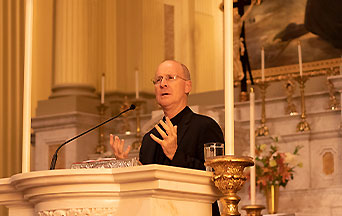
The right and left usually have very defined positions. The right defends, for example, private property, police, border security and gun rights. The left’s concerns include economic equality, critical race theory, immigration and gun control. Arguably the most significant contrast between these two sides lies in the abortion debate. The left is overwhelmingly pro-abortion, while the right has been known to defend unborn life in the past.
Fr. James Martin, however, is looking to change this.
A Liberal Agenda Behind a Facade
In 2019, the well-known American Jesuit penned an article in America Magazine titled “Why I am Pro-Life.” The magazine’s editors recently re-feature the piece, as the abortion debate has intensified following the Mississippi law that challenges the infamous Roe V. Wade decision.
The article employs many phrases attractive to pro-life advocates that immediately stand out. Fr. Martin describes the life of the unborn as “precious” and “at risk.” He also asserts that the world needs to develop a “respect for life.” How different these words sound compared to the liberal rhetoric favoring the LGBTQ agenda, so characteristic to him. The question ensues; has Father Martin changed?
He answers the question in the article by telling of an encounter at Georgetown University. He was conversing with a woman when his position regarding abortion came up. The woman expressed surprise, which he claims surprised him. It was because he also advocates for causes “usually championed by those who identify as politically progressive.”
 Learn All About the Prophecies of Our Lady of Good Success About Our Times
Learn All About the Prophecies of Our Lady of Good Success About Our Times
To Fr. Martin, pro-life means merging all these issues into one contradictory ideological position arrangement, reconciling traditional and “non-traditional” life issues. His attempt to develop an impossible “coexistence” is evident when he admitted that “many of the women I love, respect and admire support abortion rights.”
A “Broader” Version of Pro-Life
The key to understanding Fr. Martin is his broad definition of “pro-life,” which extends beyond the abortion issue alone. He incorporates leftist agitprop with his anti-abortion position. The unborn are only one among many different groups he believes need to be defended equally by activists worldwide.
His article defines a pro-life movement that would defend these threatened people.
- He says he often thinks of “the 68 million refugees, migrants and internally displaced people” as pro-life since the most important “pro-life activity” is “to flee.”
- Another life issue is the “LGBT people” and teenagers he believes are threatened not by their self-destructive lifestyles but by prejudice and rejection from their families.
- He describes as vulnerable “the lives of street-gang members in the violent, deadly and now-demolished housing projects in Chicago.”
Thus, he summarized this indiscriminate defense of life as “valuing all life,” which takes on a class struggle tone that blames all suffering on social structures and not on personal responsibility.
The “Seamless Garment” Approach
Fr. Martin adopts a “seamless garment” approach to the pro-life issue. This theory is based on the Consistent Ethic of Life statement of Cardinal Joseph Bernardin, the late Archbishop of Chicago known for his advocacy for ecumenism and establishing an AIDS task force. The approach holds that all “life” issues should be treated with equal importance and application, which naturally mitigates the significance of the abortion issue.
Eternal and Natural Law: The Foundation of Morals and Law
Fr. Martin argues that the seamless garment approach is misunderstood. The defense of these other social issues and the unborn will not weaken but strengthen one another. Thus, he proposes a redefining of the pro-life movement.
“Perhaps it is time to expand our understanding of what it means to be pro-life,” he says as he notes that “many thoughtful people who proposed other ways of framing the discussion: ‘Whole Life,’ ‘One Life,’ ‘Every Life.’ These may be some helpful ways forward.”
This proposed alternative to the current pro-life movement attempts to unite an irreconcilable conflict between virtue and vice. The defense of the unborn involves saving innocent lives. Some of the other issues mentioned encompass saving lives in need of reform and conversion. Yet other issues are politicized by the left to fit its narratives.
The mixture of all these causes fails to consider sin and the personal responsibility to avoid it. Thus, a seamless garment where one evil is practiced will only lead to its growth in the other. To expect any other outcome is illogical.
A Genuine Pro-Life Position Must Protect Spiritual Health
Fr. Martin’s solution not only contradicts what it truly means to be pro-life but also mocks it. He takes the word “life” and uses it merely in the physical, biological sense of the word. He neglects any mention of the spiritual death that sin and unnatural vice cause.
Pro-life should, above all, lead to eternal life. It should take people away from their sinful ways and convert them. The dangers to salvation by sin are much more destructive than physical harm (much also must be addressed). This misrepresentation of the real problem leads to the spiritual death of countless souls.
Science Confirms: Angels Took the House of Our Lady of Nazareth to Loreto
Fr. Martin’s “seamless garment” approach advocates tearing the link between the physical and spiritual life. This separation cannot be reconciled with a genuinely Catholic pro-life position. This approach, therefore, is nothing but a caricature of what the pro-life movement should look like.

